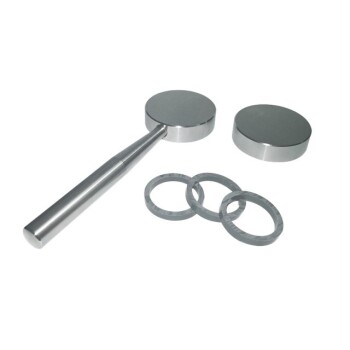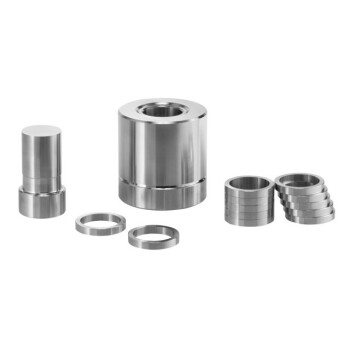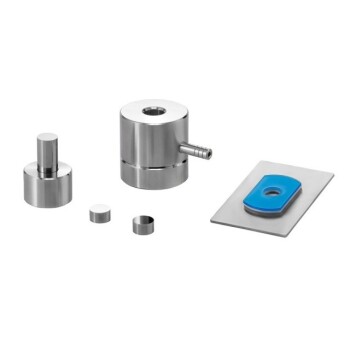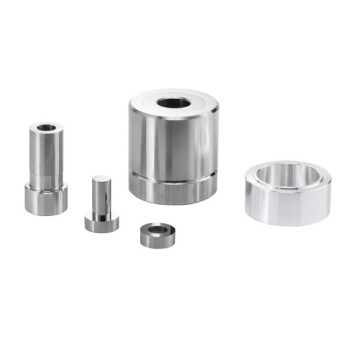In laboratory analysis, precision in a pellet press is not a luxury; it is the foundation of reliable and reproducible data. It ensures that every sample pellet you create is a near-identical representation of your material, which is the only way to generate data that is both accurate and repeatable over time.
Inconsistent sample preparation is a hidden variable that can invalidate an entire experiment. Precision in a pellet press directly controls for this variable, ensuring that any measured result reflects the true properties of your material, not the flaws in your pellet.

The Role of the Pellet in Analysis
To understand why precision is critical, we must first understand the purpose of a pellet. Many analytical techniques, such as X-Ray Fluorescence (XRF) or Fourier-Transform Infrared Spectroscopy (FTIR), require a solid, flat sample to work correctly.
Creating a Standardized Sample
The primary goal of a pellet press is to convert a non-uniform powder into a solid disc with a uniform shape, density, and size.
This process removes inconsistencies inherent in loose powders, creating a standardized form that the analytical instrument can measure reliably.
The Enemy: Uncontrolled Variables
Any variation between one pellet and the next introduces an uncontrolled variable into your experiment. Differences in density, thickness, or surface quality can alter how the sample interacts with the instrument's measurement beam.
This means you are no longer just measuring your material; you are also measuring the imperfections in your sample preparation, which corrupts your data.
How Precision Impacts Key Pellet Characteristics
A high-precision press gives the operator fine control over the compression process. This control directly translates into higher quality pellets by governing their most important physical properties.
Uniform Density and Porosity
A precise press applies force evenly across the entire surface of the platen. This ensures the resulting pellet has uniform density from edge to edge.
Inconsistent density creates internal gradients that can scatter or absorb the analytical beam unevenly, leading to inaccurate readings.
Consistent Thickness and Surface Finish
Precision mechanisms, like finely threaded rods, allow for exact control over the final position of the platen. This guarantees consistent pellet thickness every time.
Varying thickness changes the path length for spectroscopic analysis, skewing results. A precise press also helps create a smooth, flat surface that minimizes signal loss from scattering.
Preventing Cracks and Fractures
Applying force too quickly or unevenly can build up internal stress, causing the pellet to crack or fracture upon ejection.
A precision press allows for a gradual and controlled application of pressure, minimizing stress and producing a durable, intact pellet ready for analysis.
The Link Between Precision and Experimental Outcomes
The physical quality of the pellet has a direct and measurable impact on the two pillars of sound scientific work: reproducibility and accuracy.
Ensuring Reproducibility
Reproducibility is the ability to repeat an experiment and get the same result. If your pellets vary in density or thickness, you cannot truly repeat the measurement.
Precision ensures that the pellet you make today is identical to the one you make next week, making your results comparable and scientifically valid.
Guaranteeing Accuracy
Accuracy is how close a measurement is to the true value. If a pellet has a flawed surface or inconsistent density, the instrument will measure that flaw.
This introduces a systematic error, making your data inaccurate. A perfect pellet allows the instrument to measure the material's true properties without interference.
Understanding the Trade-offs
While precision is paramount, the method of achieving it involves practical considerations.
Manual vs. Automated Presses
Manual presses offer excellent control to a skilled operator and can achieve high precision. However, they are susceptible to human error and variability between different operators.
Automated presses provide superior consistency and repeatability by removing the operator from the equation, but they represent a higher initial investment.
The Human Factor
Even with the most precise press, user technique is critical. The amount of powder, how it is loaded into the die, and the rate of pressure application all influence the final pellet.
Proper training and standardized operating procedures are just as important as the quality of the equipment itself.
Making the Right Choice for Your Goal
Your specific application determines the level of precision you require.
- If your primary focus is high-throughput quality control: An automated press is superior for ensuring maximum consistency and minimizing operator-to-operator variability.
- If your primary focus is fundamental research and development: A high-precision manual press provides excellent control, but you must invest in meticulous operator training to ensure reproducibility across experiments.
- If your primary focus is educational or exploratory work: A basic press can be sufficient, but you must acknowledge and document the potential for sample variability as a limitation in your results.
Ultimately, investing in precision at the sample preparation stage is an investment in the integrity of your final results.
Summary Table:
| Key Aspect | Impact of Precision |
|---|---|
| Uniform Density | Prevents internal gradients for accurate instrument readings |
| Consistent Thickness | Ensures reliable path length in spectroscopic analysis |
| Surface Quality | Minimizes signal loss and scattering |
| Reproducibility | Allows for repeatable experiments and valid comparisons |
| Accuracy | Reduces systematic errors for true property measurement |
Upgrade your lab's sample preparation with KINTEK's precision lab press machines! Whether you need an automatic lab press, isostatic press, or heated lab press, our equipment delivers uniform pellets for reliable XRF and FTIR analysis. Enhance your data accuracy and reproducibility—contact us today to find the perfect solution for your laboratory needs!
Visual Guide

Related Products
- Laboratory Hydraulic Press 2T Lab Pellet Press for KBR FTIR
- Laboratory Hydraulic Pellet Press for XRF KBR FTIR Lab Press
- XRF KBR Plastic Ring Lab Powder Pellet Pressing Mold for FTIR
- Laboratory Hydraulic Split Electric Lab Pellet Press
- XRF KBR Steel Ring Lab Powder Pellet Pressing Mold for FTIR
People Also Ask
- What role does a laboratory hydraulic press play in carbonate powder prep? Optimize Your Sample Analysis
- How is a laboratory hydraulic press used for Tb(III)-Organic Framework FT-IR samples? Expert Pellet Pressing Guide
- How are hydraulic presses used in spectroscopy and compositional determination? Enhance Accuracy in FTIR and XRF Analysis
- How do hydraulic press machines ensure precision and consistency in pressure application? Achieve Reliable Force Control for Your Lab
- How is a laboratory hydraulic press used for polymer melt crystallization? Achieve Flawless Sample Standardization



















